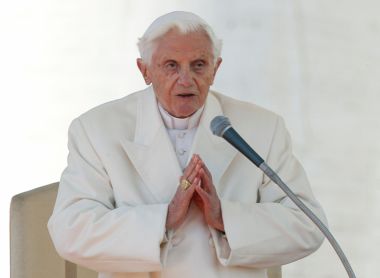Vatican official defends Benedict after Munich abuse report

(RNS) After a damaging report on clergy sexual abuse in the archdiocese headed by Cardinal Joseph Ratzinger before he became Pope Benedict XVI, the Vatican on Wednesday defended the emeritus pope, advising against seeking "easy scapegoats and summary judgments."
In an editorial published in the Vatican newspaper L'Osservatore Romano, the editorial director of the Vatican's Communication Department, Andrea Tornielli, pushed back against a wave of criticism spurred by last week's publication of a report commissioned by the Archdiocese of Munich-Freising in Germany to investigate cases of abuse from 1945 to 2019.
The report, published Jan. 20, found that 497 people in the archdiocese have been abused by clergy and alleged that three archbishops who oversaw the diocese in that time frame failed to prevent cases of abuse or to punish those responsible.
The report alleged that Benedict, who presided over the archdiocese from 1977 to 1982, allowed priests accused of varying types of abuse to continue in their ministry in at least four cases. One case, involving an abuser priest from the German Diocese of Essing, was already known to the press in 2010.
Though several archbishops were criticized in the report, "it was Ratzinger's four and a half years at the helm of the Bavarian diocese that monopolized the attention of commentators," Tornielli wrote.
He reminded critics that the Munich report "is not a judicial inquiry nor a final sentence" and said it will only help the Roman Catholic Church come to terms with its past mistakes if it is "not reduced to the search for easy scapegoats and summary judgments."
Tornielli went on to praise Benedict's commitment to combating sexual abuse as head of the Vatican's Congregation for the Doctrine of the Faith under St. John Paul II, and as pope himself.
Benedict, "once he became Pope, promulgated very harsh norms against clerical abusers, special laws to combat paedophilia," he wrote.
The emeritus pope is to be credited, according to Tornielli, not only with writing and enacting stricter measures for the prevention and punishment of abuse, but also for promoting "that change of mentality that is so important to counter the phenomenon of abuse: listening and closeness to the victims to whom forgiveness must always be asked."
The editorial reminded readers that Benedict was the first pontiff to meet with victims of abuse during his foreign trips, against the advice of his staunchest defenders — the "Ratzingerians."
Tornielli didn't defend the abuse of children, calling it "a horrendous crime" that is especially "revolting" when committed by members of the clergy. The editorial also acknowledged that victims and their families "have often been distanced and even pointed to as 'enemies' of the Church and its good name."
Benedict announced Jan. 20 through his personal secretary, Monsignor Georg Gänswein, that he will comment on the report once he has carefully read it. The report itself was accompanied by a lengthy transcription of Benedict answering questions from lawyers, in which he denies any wrongdoing.
© Religion News Service











